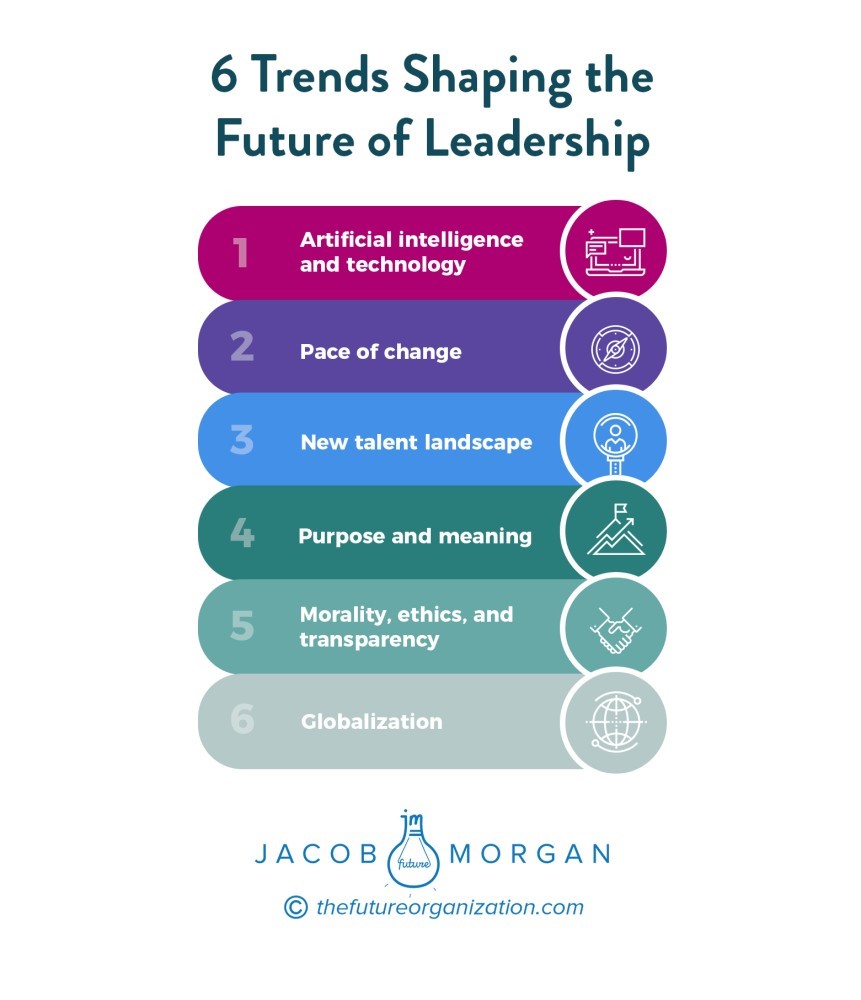How and why is leadership changing and what does it take to be a successful leader?
To answer this question I spoke with over 140 CEOs around the world from organizations like Best Buy, Accor, Oracle, Verizon, KPMG, Unilever, Audi, and many others.
These CEOs collectively identified 6 trends which are shaping leadership, both today and in the future. If you want to download a copy of the PDF which features all 6 of these trends you can do that here.
It used to be that leaders who were the loudest, brashest, and most ego-driven were the ones who got noticed and seemed to be the most successful. Those days are gone, and a new wave of humble servant leaders has taken their place. A push for morality, ethics, and transparency has led to more authentic and humble leaders. Companies with ethical foundations perform better financially and have higher customer and employee satisfaction. In one study, the bottom-scoring companies on business ethics were four times more likely than top-scoring ethical companies to experience a severe stock-price loss.

The need for transparency has never been greater. Through social media, leaders are under a bright spotlight and can have their every move criticized. At the same time, employees, customers, and shareholders demand authentic leaders who don’t hide behind their titles but who are actively engaged with their companies and showing their personalities and values. Leaders of the future must determine their moral compasses and have a strong sense of their personal beliefs. They need to be trustworthy and act according to their personal moral code. Simply standing still is no longer good enough; leaders need to take a stand and be as authentic and transparent as possible.
What you can do now:
- Create your own definition of leadership. Think about what matters to you as a leader and what characteristics and skills you prioritize in leaders and then work to build those in yourself. With a strong definition, you can put filters in place to promote and train the best future leaders.
- Create your personal code of ethics. Decide what you stand for and the personal guidelines you will follow to make good decisions. Establishing your ethical and moral compass now makes it easier to make the right decisions in the moment, even if they are difficult.
- Practice transparency with your leaders and colleagues. You don’t have to be a leader to give transparent updates on projects and authentically share your work and personality.
- Demand transparency in your organization. Ask questions and make it clear that employees want leaders who are ethical, authentic, and transparent. Do your part to build a culture of transparency that you can build on as a future leader.
“Future leaders must practice constant reflection and transparency, not just by themselves but with their teams. When I hold meetings, anyone is allowed to question a practice, a policy, or a behavior in our company and they are also allowed to question me as a leader. There should be no place for leaders to hide in their organizations.” –Wolf-Henning Scheider, CEO of ZF Friedrichshafen
“Leadership will be a much more public endeavor than it has been in the past. It will require increased awareness of social issues and a recognition that clients want to do business with companies that contribute to a greater social good.” –Bill Rogers, chairman and COO of Truist Financial Corporation
. . .
There are 6 trends that are transforming leadership forever do you know what they are and are you ready for them? Download the PDF to learn what these 6 trends are and what you should be doing about each one of them. These are crucial for your leadership and career development in the future of work!

